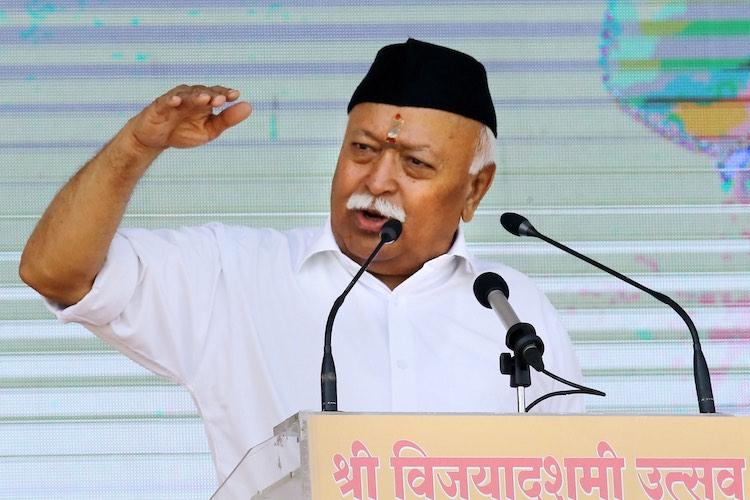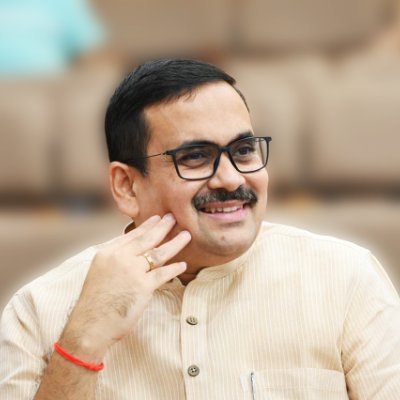Abrogation of 370 demonstrated the nation’s readiness for a change in thought process.
In his Vijaya Dashami address, RSS Sarsanghchalak Dr Mohan Bhagwat referred to and drew attention to certain fundamental and core thoughts. These thoughts, whether one accepts them or not, whether one chooses to ignore or to internalise them, are essential to our march as a civilisation and for furthering our aspirations as a civilisational state. Except for the extremely purblind and incorrigible cynics who do not wish to acknowledge it, there is indeed an enhanced sense of collective self-pride and self-esteem, as Bhagwat termed it, “an awakened sense of pride in the country”.
On the abrogation of Article 370, Bhagwat pointed out that this reflected the sentiment and wishes of the people of the country. Rightly so, for those who actually went out across the country – in course of a countrywide Sampark – explaining to people the benefits and the necessity of abrogating Article 370, one invariably met people, ordinary citizens, conscious voters, who came forward to say that this was the right step, long-awaited and that this would strengthen India’s national security, her unity and would now provide more opportunities to the people of the region. Interestingly, there was no triumphalism in their attitude. When they spoke, they exuded a sense of welcome of the people of the region. Bhagwat spoke of how this historic effort will come to fruition only when “justice denied under the influence of Article 370 is restored, injustices occurred are brought to an end”.
This is also the core objective of this effort at abrogating 370. Prime Minister Modi’s vision of a new narrative of this region also spoke of how it was a shackle for people of this region. Bhagwat reminded us that the process of abrogating 370 was done “skilfully” by “garnering the support of other parties in both houses, with strong logic and plea in consonance with the public sentiment”. For those who whine that the exercise was “undemocratic”, this is an important pointer, that the effort had garnered cross-party support, had been debated and passed in both houses with a majority and was an entirely democratic exercise.
Referring to the Kashmiri Pandits “who were unjustly driven away” and the need to bring them back and ensure for them a secure existence, Bhagwat also pointed out that now that 370 was out of the way, “many a right of residents of Kashmir which were denied to them so far will be restored, and false fears instilled in the minds of brothers of the Valley that there is threat to their property and jobs due to the nullification of Article 370, will be removed and having done away with those fears, they will be able to perform their duties towards the country’s development with brotherly affinity and concord with the people of the rest of Bharat.” This message of cohesion, of unity and synergy, of assurance and solidarity, was obviously omitted by many self-styled interpreters of Bhagwat’s words, it did not suit their narrative of the RSS and its world view.
Bhagwat described the fundamental struggle for the destiny of India when he said that in the past few years, there has been a “transformation in the direction of the thought process of Bharat” but that there are “many people in the world and in Bharat as well, who do not want this”. A “developed Bharat”, he said, “creates fear in the minds of vested interests. Such forces will also not want Bharat to be strong and vibrant” and the methods that they adopt to create instability and conflagration is by “widening the fault-lines already existing in the society, imposing fabricated identities on manufactured separations, thereby creating diverse and conflicting streams in the national mainstream”.
On one hand, attempts and efforts to position India as a global player and power is being made without respite. India’s capacities for successfully navigating rough waters of international diplomacy is growing, she is taking steps to lead a number of global initiatives. This reflects a change of the collective mindset in the way she is being looked upon by the world, signifying a clear change in the scale of thinking. And, on the other, India sees a continuous chorus spewing out fake narratives and carrying out false propaganda, distorting issues, half-reporting and false reporting instances with the sole and overarching intention of retarding India’s repositioning as a responsible major global power.
These forces and elements want India to remain a pusillanimous power. Their narrative of India is that of a divided society, led by hesitant leadership, unsure of its roadmap, uncertain of its global traction, weak in the articulation of its national interest and conceding in its dealings. It is such an India that they wish to see. It serves their ideological goal and it also serves the interests and objectives of those who want to fragment and cast India aside. Bhagwat cautioned against these subversive elements.
In order to persist with this transformation in the thought process of Bharat, one had to focus on our inherent strengths and uniqueness, on what Bhagwat referred to as “Swa” – our self, the defining, the civilisational, the core self. Those who have no knowledge of our educational struggle, of the movement for a national education for India, during the heyday of our struggle for independence, those who have no idea of how all our thought-leaders and political leaders of that epoch spoke of and wrote on the need for this “Swa” directed and focused education, expressed indignation at Bhagwat’s comment. This deracinated lot has always castigated and opposed any debate along these lines. When Bhagwat articulated the following, he was calling for the need to recalibrate that which must realise itself in comprehensive knowledge and pride about our language (Swa Bhasha), our attire (Swa Bhoosha), and our culture (Swa Sanskriti). He also spoke of the need for a radical transformation of the curriculum of teacher’s training. These are the very points and dimensions that our thought-leaders across the decades, including Sri Aurobindo, Mahatma Gandhi, Gurudev Tagore, KM Munshi, Sister Nivedita, Ananda Coomaraswamy and a host of others have striven for and mentioned. They were convinced that a liberated India would pay heed and base its educational reorganisation on these pillars.
That the Nehruvian establishment and the consensus that it spawned chose to ignore these, is another debate and issue. One is, thus, surprised to note the element of shock that Bhagwat’s call for educational recalibration has generated in some quarters. The ignorant have read his words through the lens of reductionism.
Like he had done in September 2018, through his series of public addresses in Delhi, Bhagwat again, in no uncertain terms, clearly defined and articulated the definition of the word Hindu and the Sangh’s formulation of a Hindu Rashtra. The word, he pointed out was “not confined to just those who call themselves Hindus. Those who belong to Bharat, those who are descendants of Bharatiya ancestors, those who are working for the ultimate glory of the nation and joining hands in enhancing peace by mingling with others and accepting, respecting and welcoming all diversities; all those Bharatiyas are Hindus. Whatever may be their mode of worship, language, food habits, lifestyle, and native place, those will not make any difference”. Real free porn movies https://exporntoons.net online porn USA, UK, AU, Europe.
Naturally, for those who are not working for “the ultimate glory of the nation” and are aiming at halting the transformation in the direction of the thought process of Bharat, Bhagwat’s address and thoughts were unsettling; they felt exposed by his articulations.
(The author is Director, Dr. Syama Prasad Mookerjee Research Foundation)
(The views expressed are the author's own and do not necessarily reflect the position of the organisation)


